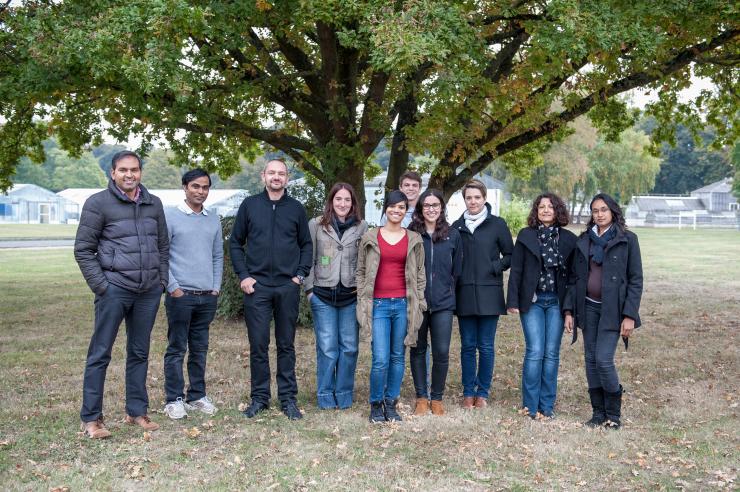
Agroecology Reading time 6 min
Raphaël Mercier, delving into the heart of cell division
Published on 13 December 2016
A child of farmers who dreamed of becoming a researcher
Mercier’s dream of becoming a researcher started in early high school. He even chose his future field of study: genetics. His love for science was not a family affair, as it is for many researchers, because he was the child of farmers. He was born and raised in the administrative department of Maine-and-Loire. After earning advanced degrees in cell biology and genetics, he successfully obtained a position at the INRA center in Versailles-Grignon. It was there that he started to study meiosis, a subject that has become his passion. He freely admits, “I am obsessed with meiosis.” Meiosis is a universal cellular process that produces reproductive cells. During meiosis, genetic material is mixed before the chromosomes are divided up. It is a crucial step in the lives of organisms that reproduce sexually. In humans, errors during meiosis are responsible for Down syndrome and explain 40% of miscarriages.
Plants: an ideal study system in genetics
“The genes involved in meiosis are remarkably well conserved among organisms as different as yeasts, plants, mice, and humans. Therefore, identifying such genes in the plant model Arabidopsis thaliana should help us identify their homologs in other species, but working with Arabidopsis is much easier,” explains Mercier as he purposefully strides through one of the center’s experimental greenhouses. He continues, “It is straightforward to plant hundreds of Arabidopsis mutants in a greenhouse and identify those that are sterile and, more specifically, those whose sterility is linked to meiotic errors. Then, thanks to the incredible advances that have been made in sequencing, we can simply sequence the genomes of the target mutants and identify the gene causing the problem.”
Revolutionizing plant breeding
Over the last fifteen years, Mercier and his colleagues have characterized around 60 genes involved in meiosis thanks to Mercier’s work on Arabidopsis mutants. Certain of these genes interfere with chromosomal mixing, or crossing over; others facilitate it. There are advantages in both cases. When crossing over is impeded, one obtains offspring that are identical to the mother plant, an outcome that is somewhat of a holy grail in plant breeding. It means certain hybrid plant varieties can be perpetuated without having to continually cross the original parent species. When crossing over is ramped up, genetic diversity is enhanced and one can obtain novel genomes that can be useful in different agricultural contexts. Consequently, Mercier’s research has had a major impact in the field of plant biology.
Just the right fit
Although he is relatively young for a researcher director, Mercier feels his position is a good fit for him. He comments with a smile, “Although those in the lab will be the first to see the results, I don’t mind being second because I get to hear about a team’s worth of discoveries.” His research team is composed of around 10 people—technicians, engineers, and students—who love talking about their work. In general, no one waits for the weekly meeting to pass along exciting findings to him. He continues, “I am also rather lucky to work with four other PIs (1) with whom I get along extremely well. Over the last 15 years, we have managed to maintain a healthy and productive rivalry without becoming overly competitive.”
There is no applied research without basic research
“Although I am always thinking about the applications of my work, my main goal is to understand the mechanisms and solve the enigmas that have remained at the heart of genetics research over the last 100 years,” Mercier explains. This is no surprise, given the scientist’s keen intellect. In his spare time, he likes to watch lengthy crime series involving complex mysteries.
It is because INRA offers excellent resources for those carrying out basic research that the institute can snare scientists like Mercier, whose discoveries can result in key applications, sometimes in entirely unexpected ways. Mercier’s research provides a perfect example of the axiom “there can be no applied research without basic research.”

1 Mathilde Grelon, Eric Jenczewski, Christine Mézard et Fabien Nogué.
One question continues to haunt Raphaël Mercier: what controls the number of crossing-over events (1) that take place during meiosis? This number is highly constrained and averages about two per chromosome and per meiotic cycle in most species. It is known that at least one is required for chromosomes to properly separate into the daughter cells. However, Mercier has also found that at least ten crossing-over events can take place per chromosome and per meiotic cycle without affecting reproduction. So, what keeps the average at two? Is it because too much genetic mixing is undesirable? These are the types of questions Mercier is asking himself as he digs deeper into the mysteries of meiosis. First, he would like to identify new, relevant genes and understand how they are organized in networks. Then, it might be possible to develop a mechanistic model describing this crucial cell division process.
(1) Crossing-over occurs when DNA fragments are exchanged by homologous chromosomes during the first meiotic division. It takes place in two steps. First, the DNA strands are broken. Second, as they are being repaired, fragments are swapped. During a given meiotic cycle for a given chromosome, the DNA strand is broken at a minimum of 250 locations. Most repairs occur without incident. However, on average, two result in crossing-over events.
- 42 years old
- 1998: Earned a Master of Plant Genetics from the University Paris-Sud/AgroParisTech
- 1998-2001: Earned a PhD in Plant Biology at the Jean-Pierre Bourgin Institute, INRA Versailles-Grignon
- 2002-2003: Worked as a postdoc at the School of Biosciences, University of Birmingham, England
- 2003: Hired by INRA as a research scientist
- 2009: Accreditation to supervise research, University Paris-Sud
- 2010: Became a research director
- 2015: Became a senior research director
A sample of Mercier’s funding and awards
- 2014: Young researcher award from the Schlumberger Foundation for Education and Research
- 2014: Award from the Simone and Cino del Duca Foundation (Institute of France)
- 2012: Appearance on the top-ten list of discoveries in the French-language magazine La Recherche
- 2011: European Research Council Starting Grant
- 2010: Discovery of the Year Award in Biology from the French National Academy of Sciences
- 2002: Silver medal from the French Academy of Agriculture (PhD research)
Since 2019, he is the Director of the Department of Chromosome Biology at the Max Planck Institute for Plant Breeding in Cologne, Germany.
